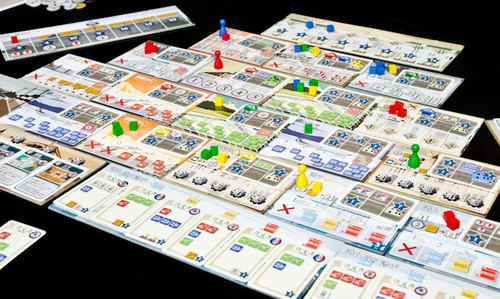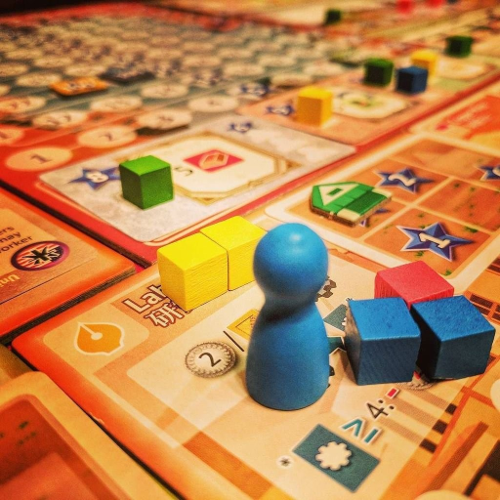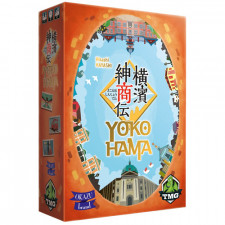Yokohama Review
on Jun 6, 2017
When you first open Yokohama, the sheer number of components and tiles can be a little overwhelming. There are order cards and technology cards, items in hand and items in warehouse, additional actions before and after a main action, five different types of goods, and foreign agents. Thankfully, though, all of those bits and bobs gel well together. A fiddly experience is largely avoided and the game presents a robust challenge of efficiency and strategy.

Not quite "uncharted" territory here.
The players are procurers. Each turn, they’ll use their assistants and company president to gather goods and then turn those goods in for points- usually. They can also invest in technology, make use of imported goods, or even demonstrate their faith at church. The board is a randomized set of tiles placed in a pyramid shape. Each tile provides a particular action and each is also given a randomized Building Card that provides bonuses for building trading posts or shops there.
On their turn, a player sends three assistants to three different tiles (or two to the same tile). Then they move their president. Generally, you can move him to any tile that isn’t already occupied by another president, but you must do so by moving through tiles that contain your assistants. The assistants, then, provide you with needed maneuverability.
Once moved, you carry out the action on the tile where your president is. And that action is generally better the more power you have. You get power for your president, for each assistant you have there, and for any buildings you’ve constructed on that card. If your power is high enough, you can construct a building or get a special bonus. Then, all of your assistants on the tile come back to your hand. Assistants, then, are also a key source of power but deplete after use.
This core mechanic of the game is really interesting. Placing and picking up assistants is critical. You can’t just take any action you want. You can only take those that your president can move to. So it’s essential that you place assistants along the paths you intend to take. But every time you use an action, you’ll lose all the assistants there entirely. This push and pull is extremely engaging and greatly expands the space for tactical and strategic play.
Although that central mechanism is interesting, Yokohama is so much more. You can go to the laboratory and grab up technology cards. Each provides a special power that will assist you throughout the game. Also widely claimed is the Port action. That one gets you access to new Order cards. Fulfill those Orders by discarding the indicated goods, and you can get points, coins, and imports.
Imports are a special kind of good. For the most part, they are used as a sort of super currency. Several of the other actions can be boosted by giving up imports. At the Church, for instance, you acquire Faith points which can immediately be used to place a worker on a special church board bestowing points. Delivering goods, including imports, can increase your standing. Alternatively, players can vie for the best spots on the Customs board. There, you specifically discard imports in order to claim a spot worth a ton of points.
One of the beauties of Yokohama is the wealth of available strategies. It’s perfectly viable to focus on fulfilling orders. But trying to get on the Customs or Church boards is also a great way to score, as is grabbing buildings from your warehouse and then constructing them. The result is a title that feels tightly economic, but still provides a wide enough decision space that players have free choice in how to pursue their goals.
The wide decision space is further reflected in the end-game triggers. The game can end abruptly as one player builds all of his shops or all of his trading posts. But it’s not just about building. If the Church or Customs boards fill up to a certain level, that will also trigger the end of the game. Because the ending can arrive in a variety of ways, the actual breaking condition tends to sneak up on you. There’s almost a feeling of mild paranoia as you know that you have limited time to squeak out those last few points.

A closer view of the action. Such as it is.
Yokohama will absolutely delight players who enjoy efficiency games. There is certainly some resource management, and an interesting spatial action selection mechanism. But the core of the game has an economically driven euro style, which isn’t to say that it’s without interaction. Blocking off places with your president can be brutal on the other players – forcing much less optimal moves.
But while the puzzle and strategy of Yokohama was immediately apparent and engaging, it doesn't tell much of a story. The narrative is fairly weak and you can often feel like your just pushing around so much cardboard. If you like strong and engaging themes, then perhaps this isn’t the title for you. If you enjoy puzzles and strategy, though, it abounds.
If you enjoy medium/heavy Euro titles, you’ll feel at home here. Yokohama isn’t a retread of other previous Euro ideas. It’s a fresh blending with an enjoyable result. Fans of the genre will find a lot to love, but this title isn’t likely to win any new converts for those skeptical of cube-and-resource games.

 Customer Support
Customer Support  Subscribe
Subscribe 




 Account
Account  Wishlist
Wishlist 

